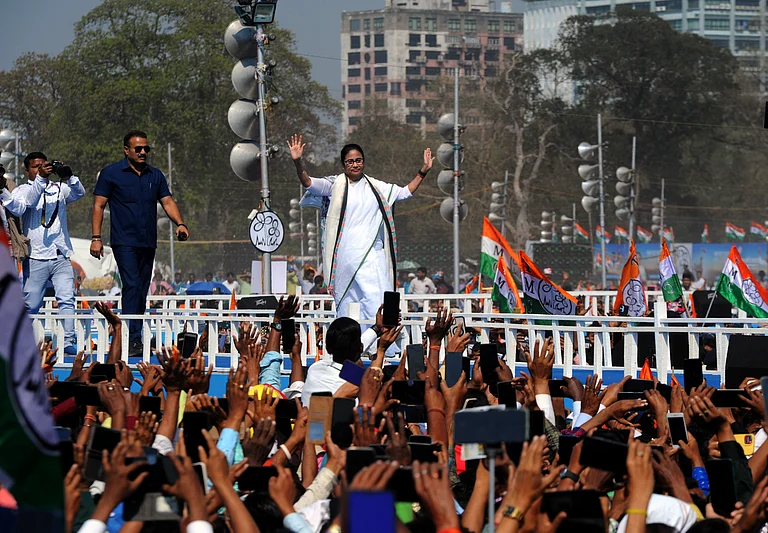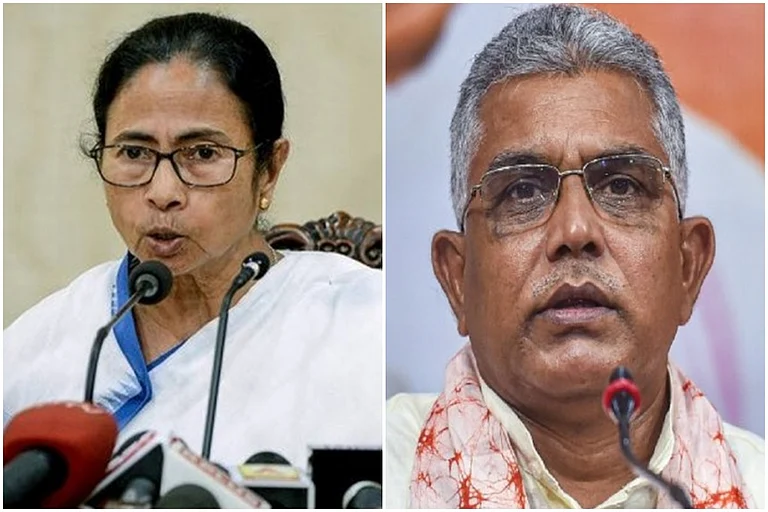On March 10, when West Bengal’s ruling party, Chief Minister Mamata Banerjee’s Trinamool Congress (TMC), named three Lok Sabha candidates from the state who are residents of other states, many political observers thought the TMC was trying to tone down on its Bengali identity-oriented politics and anti-outsider pitch.
Mamata Banerjee Blends Bengali Regionalism With Inclusivity As She Sharpens Poll Pitch
West Bengal Chief Minister Mamata Banerjee accused the BJP of importing ‘alien Hinduism’ but says ‘we love everyone’
As the TMC fielded former actor Shatrughan Sinha and former cricketer Kirti Azad – both of them former BJP parliamentarians from Bihar – and former cricket Yusuf Pathan, who is a Gujarat resident, the BJP’s state unit president, Sukanta Majumdar asked whether the TMC would also dub them as “outsiders”.
Over the past five to six years, Banerjee’s party has consistently referred to the BJP as an “outsider force”. Leader of the opposition in the state assembly, Suvendu Adhikari of the BJP, highlighted in a social media post how not only the three Lok Sabha candidates but also TMC’s Rajya Sabha MPs include Saket Gokhale and Sagarika Ghose, who live in Delhi, and Sushmita Dev, who is from Assam.
“According to the Indian Constitution, no Indian citizen from any state can be called an outsider in any other state. We never branded anyone as an outsider. But the TMC leadership has always identified national leaders as outsiders according to their advantage or comfort,” Adhikari wrote.
Two days later, while addressing a rally in Bangladesh-bordering North 24 Parganas district, Banerjee made it evident that she is going to pursue the ‘outsider’ campaign against the BJP but not against any community. She blended Bengali regional identity and ethnic pride with the politics of inclusivity in her party’s Lok Sabha election pitch.
While taking potshots at the BJP over rules framed under the Citizenship Amendment Act (CAA) 2019 – which was notified on March 11 – she called the mechanism “a ploy to drive Bengalis out of the country” and alleged that the BJP wants to destroy “our culture, our heritage” and “torture our people.”
“They don’t follow true Hindus like Ramakrishna (Paramahamsa), Maa Sarada and Swami Vivekananda. They have created a Hindutva of their own, which is alien to Bengal (Bohiragoto Hindutva),” Banerjee said, adding, “Bengal’s, and even India’s, Hinduism has nothing to do with it.”
She cited how Vivekananda, the nineteenth-century monk, shared a hookah with people from lower castes after hearing that such sharing makes an upper caste Hindu an outcast.
Banerjee accused the BJP of calling Sikhs as Khalistani, Muslims as Pakistani and Bengalis as Bangladeshi and alleged that many Bengali Indians had to face harassment in Delhi on suspicion of being Bangladeshis.
“Our language is the same, this can’t be our crime. We had an undivided Bengal. Both parts of Bengal speak the same language. But the BJP gets furious whenever they hear someone speaking Bengali,” she said.
Banerjee dubbed the CAA Rules and the proposed citizenship screening exercise in the style of Assam’s National Register of Citizens (NRC) as ploys “to drive Bengalis out of the country.” She even claimed that all exercises around CAA and NRC are part of a plan to bifurcate Bengal.
However, she soon made it clear that she had nothing against people from outside Bengal in general. “We love Hindi-speaking people. We love Jains, Christians, Buddhists,” she said and went on to use a series of quotations from the writings of Rabindranath Tagore and Kazi Nazrul Islam championing communal harmony and inclusivity. “We are all Indian and I don’t agree to any divisions,” she said.
It was part of her plan to bring Bengali ethnic politics and Indian nationalism together that Banerjee announced in 2019 that her party will henceforth have three slogans – Jai Hind and Vande Mataram as before and Joy Bangla (Victory to Bengal) as the new slogan. Joy Bangla is better known as one of the most popular slogans of the Bangladesh Liberation War.
Banerjee’s Tuesday event ended with repeated shouting of Joy Bangla, several times more than Jai Hind and Vande Mataram. Throughout the speech, she highlighted only Bengali icons – from Tagore, Vivekananda, Bankim Chandra Chatterjee, Ishwar Chandra ‘Vidyasagar’, Subhas Chandra Bose and Khudiram Bose to spiritual gurus Loknath and Anukul Chandra and dalit community icons Harichand Thakur and Panchanan Barma, among others.
Blending Nationalisms
Speaking on condition of anonymity, a TMC Lok Sabha member says that the party chief made the party’s line clear during her Tuesday speech.
“We are for protecting Bengalis and Bengali culture from the external aggression being engineered by the BJP and the Sangh Parivar but we do not espouse hatred towards any community. Bengali culture signifies inclusivity and pluralism. Our candidate list is testimony to our pluralism. This is how the party will take the ideological campaign forward,” the MP tells Outlook.
The TMC turned to Bengali ethnic politics in 2018, after realising that the Sangh Parivar was trying to consolidate Hindus in the state by popularising festivals like Ram Navami and Hanuman Jayanti.
However, they were actually responding to the trend of Bengali ethno-cultural activism that was already being popularised by newly formed groups like Bangla Pokkho, which has ‘Hindi-imperialism’ as its principal enemy, since 2016-17. The TMC did not take any anti-Hindi approach though and even established a Hindi University.
The roots of Bengali identity politics are a century and a half old. Hindu nationalism, Bengali nationalism and Indian nationalism were all born in colonial Bengal between the 1860s and the 1880s. There was a wave in Bengali cultural nationalism over the anti-Partition movement during 1903-1911. In the 1920s, ‘Deshbandhu’ Chittaranjan Das, the political guru of Subhas Chandra Bose, took Bengali identity to the forefront of his politics, arguing that Bengali ethno-linguist identity was above religious divides.
Das, who was elected as the Congress president in 1921, took great pride in his Bengali identity, culture and traditions and asked Bengalis to stick only to their Bengali identity. He argued that the Shaivaiite and Vaishnav traditions of Bengal had nothing to do with the preachings of south India’s Adi Sankara and Madhavacharya, and that Bengalis did not need to learn from them. However, he never espoused hatred towards any community, not even Europeans.
During the 1940s, the religious divide triumphed over linguistic identity, leading to Bengal and India's Partition. In West Bengal of independent India, both Hindu nationalism and Bengali nationalism took a back seat, as politics revolved around a Congress versus Left bipolar alignment. Class emerged as the main identity.
In recent years, TMC has tried to blend Bengali nationalism and Indian nationalism to counter the Sangh Parivar’s Hindu nationalism.
Notably, Banerjee’s comments on Tuesday targeting the BJP for importing a brand of Hinduism alien to Bengal came less than a week after her government announced a state holiday on the occasion of Ram Navami, which falls on April 17 this year.
This is the first time in post-colonial Bengal that a government holiday has been announced on the occasion of Ram Navami, which has been a minor festival in the state until various organisations belonging to the Rashtriya Swayamsevak Sangh (RSS), the ideological-organisational parent of the BJP, started popularising it since 2017.
Since 2017, Banerjee’s government and the party have, on the one hand, repeatedly blamed the saffron camp for brandishing swords and other weapons in the Ram Navami procession and using the rallies to create communal strife, while on the other party leaders started organising their own Ram Navami celebrations.
In January, the party had turned down the invitation to attend the consecration ceremony of the newly built Ram Temple in Ayodhya’s once-disputed land, with her nephew, TMC all-India general secretary Abhishek Banerjee calling it “a place of worship… built over hatred, violence and dead bodies of innocents.”
But Mamata Banerjee has repeatedly shown she does not want any section of the society to remain unaddressed. If the party’s stand on the Ram Temple consecration event was meant to assure its secular-liberal support base, and Muslims in particular, declaring a state holiday on Ram Navami is her message to Ram Bhakts.
“We have now made it clear that we have nothing against Lord Ram or Ram Navami but we are against the BJP’s divisive politics against Lord Ram,” explains a Bengal minister, adding that the TMC can not take any position against any community, as it also has a presence in the states of Assam, Meghalaya and Tripura, and has no plan of abandoning its aspirations beyond Bengal.

